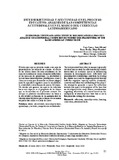| dc.rights.license | http://creativecommons.org/licenses/by-nc-sa/3.0/ve/ | es_VE |
| dc.contributor.author | Cayo Lema, Luis Efraín | |
| dc.contributor.author | Razo Ocaña, Hugo Ramiro | |
| dc.contributor.author | Rivas-Urrego, Gabriela | |
| dc.date.accessioned | 2020-11-20T16:02:54Z | |
| dc.date.available | 2020-11-20T16:02:54Z | |
| dc.date.issued | 2020-11 | |
| dc.identifier.issn | 0798-1570 | |
| dc.identifier.uri | http://www.saber.ula.ve/handle/123456789/47092 | |
| dc.description.abstract | El texto que aquí se presenta remite a un aspecto
generalmente no tomado en cuenta: el afecto
en las interacciones docente-estudiantes en los
espacios académicos como elementos influyentes
en los procesos de aprendizaje. La afectividad y
las relaciones intersubjetivas contribuyen a crear el
clima necesario para desarrollar en forma integral
tanto la capacidad cognitiva como la sensibilidad,
la creatividad y otras formas de pensar del sujeto.
Un intento por generar un espacio de reflexión
hacia este aspecto es el propósito de las líneas
que se desarrollan en el presente ensayo. De
allí que se planteen consideraciones en torno a
la afectividad en función de la multiplicidad de
vínculos intersubjetivos que se dan en ese escenario
tan particular como es el aula de clases. | es_VE |
| dc.language.iso | es | es_VE |
| dc.rights | info:eu-repo/semantics/openAccess | es_VE |
| dc.subject | Afectividad | es_VE |
| dc.subject | Intersubjetividad | es_VE |
| dc.subject | Aprendizaje | es_VE |
| dc.subject | Currículo | es_VE |
| dc.subject | Competencias actitudinales | es_VE |
| dc.title | Intersubjetividad y afectividad en el proceso educativo: análisis de las competencias actitudinales en el marco del currículo latinoamericano | es_VE |
| dc.title.alternative | Intersubjectivity and affectivity in the educational process: analysis of attitudinal competences within the framework of the latin american curriculum | es_VE |
| dc.type | info:eu-repo/semantics/article | es_VE |
| dcterms.dateAccepted | Junio-2020 | |
| dcterms.dateSubmitted | Junio-2020 | |
| dcterms.publisher | SaberULA | |
| dc.description.abstract1 | The text presented here refers to an aspect generally
not taken into account: the aff ect on teacher-student
interactions in academic spaces as influencing
elements in learning processes. Aff ectivity and
intersubjective relationships contribute to creating
the climate necessary to comprehensively develop
both the cognitive capacity and the sensitivity,
creativity and other ways of thinking of the subject.
An attempt to generate a space for reflection
towards this aspect is the purpose of the lines that
are developed in this essay. Hence, considerations
regarding affectivity are raised based on the
multiplicity of intersubjective links that occur in
that particular setting, the classroom. | es_VE |
| dc.description.colacion | 81-87 | es_VE |
| dc.description.email | cifranueva@ula.ve | es_VE |
| dc.description.email | luis.cayo@utc.edu.ec | es_VE |
| dc.description.email | hugo.razo@utc.edu.ec | es_VE |
| dc.description.email | gabrielarivasu@gmail.com | es_VE |
| dc.description.frecuencia | Semestral | |
| dc.description.paginaweb | http://www.saber.ula.ve/cifranueva/ | |
| dc.identifier.depositolegal | P P92-0047 | |
| dc.identifier.edepositolegal | ppi 201202ME4019 | |
| dc.identifier.eissn | 2244-8438 | |
| dc.publisher.pais | Venezuela | es_VE |
| dc.subject.institucion | Universidad de Los Andes | es_VE |
| dc.subject.keywords | Affectivity | es_VE |
| dc.subject.keywords | Intersubjectivity | es_VE |
| dc.subject.keywords | Learning | es_VE |
| dc.subject.keywords | Curriculum | es_VE |
| dc.subject.keywords | Attitudinal skills | es_VE |
| dc.subject.seccion | Cifra Nueva: Artículos | es_VE |
| dc.subject.tipo | Artículos | es_VE |
| dc.type.media | Texto | es_VE |


